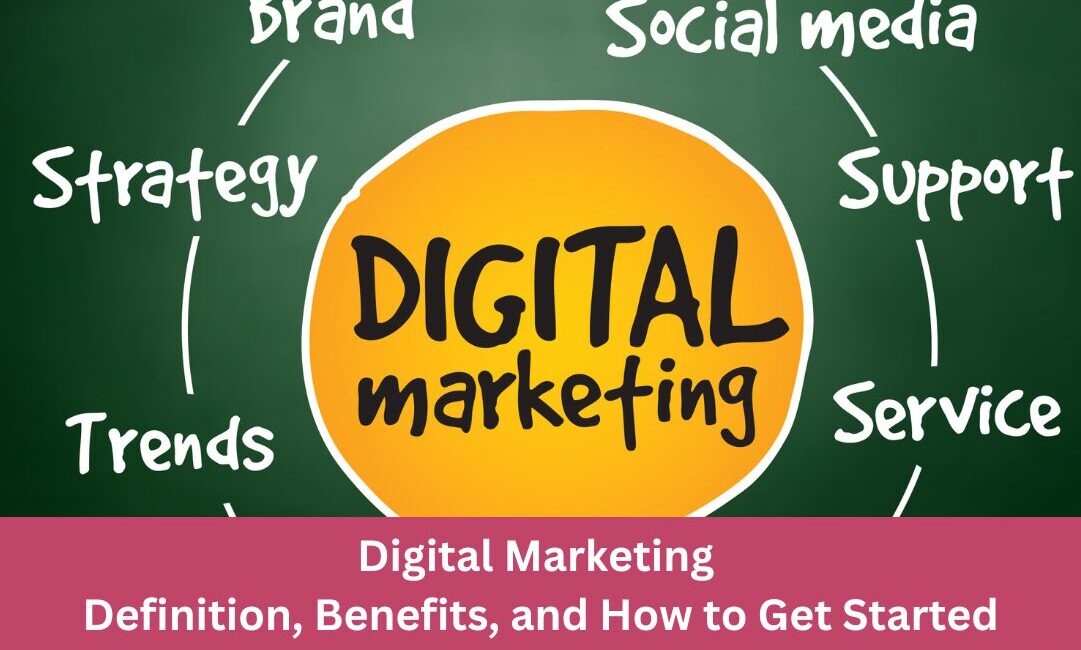What Is Digital Marketing?
According to Wikipedia, Digital marketing is the use of internet-connected devices and online platforms to promote products and services. This includes everything from social media and email campaigns to search engines and paid advertising. Digital marketing helps companies engage with their audience where they already spend time online.
Whether you’re running a local service business or an eCommerce store, digital marketing allows you to stay visible, relevant, and competitive in today’s digital-first world.
Types of Digital Marketing Channels
Search Engine Optimization (SEO)
SEO improves your site’s visibility on search engines like Google by optimizing content, technical structure, and backlinks. Strong SEO delivers long-term, organic traffic and increases your brand’s authority.
Content Marketing
This involves creating valuable and informative content like blogs, videos, or downloadable guides to educate and attract your target audience. Content also powers SEO, email, and social media strategies.
Social Media Marketing
Used to build brand awareness and foster community on platforms like Instagram, LinkedIn, and TikTok. Both organic content and paid ads can be used to drive engagement and conversions.
Email Marketing
One of the highest-ROI channels. Email allows businesses to nurture leads, promote offers, and build relationships with both prospects and existing customers.
Pay-Per-Click Advertising (PPC)
Paid ads on platforms like Google Ads or Meta Ads help you reach your target audience instantly. PPC is especially useful for high-intent searchers or testing offers.
Why Digital Marketing Matters
1. Visibility Where It Counts
According to Think with Google – Omnichannel Shopping Behavior, over 87% of shoppers begin product searches online, even if they intend to purchase in-store. Without a strong digital presence, you risk being overlooked.
2. Cost Efficiency
Unlike traditional marketing, digital marketing enables precise targeting and lower upfront investment. You can test small campaigns and scale what’s working.
3. Measurability
From email open rates to ad click-throughs, every action is trackable. This lets you make data-backed decisions, refine campaigns, and improve ROI.
4. Agility and Scalability
Want to pivot your messaging? Launch a new product? Test a different audience? Digital marketing lets you do all of this quickly, without long lead times.
Core Components of a Digital Marketing Strategy
Website Optimization
Your website must function as your 24/7 sales tool. Focus on:
Fast load times
Mobile-first design
Clear calls to action
Lead capture systems (like forms or bookings)
Copy that speaks directly to your ideal client
Each page should serve a purpose: attract, educate, convert, or retain.
Search Engine Optimization (SEO)
SEO isn’t just about ranking, it’s about relevance and trust. A solid SEO strategy includes:
Keyword research
Technical SEO (site speed, meta data, mobile responsiveness)
High-quality content
Local optimization if you serve a specific region
According to Search Engine Journal, 93% of online experiences begin with a search engine.
Content Strategy
Content provides value before someone becomes a customer. It should:
Solve problems
Reflect your expertise
Be consistent in voice and frequency
Support SEO, email, and social media initiatives
Tip: Focus on quality over quantity—pillar posts, evergreen guides, or valuable downloads perform better than scattered posts.
Social Media Strategy
Instead of being everywhere, pick 1–2 platforms your audience already uses. Share:
Behind-the-scenes moments
Client results
Tips or tutorials
Calls to action
Use paid promotions to amplify high-performing posts or drive traffic to your website.
Email Automation
Use email to:
Welcome new subscribers
Educate your audience
Send timely offers
Re-engage inactive leads
Segment your list by behavior or interest to improve open and conversion rates. Tools like MailChimp, ActiveCampaign or MailerLite help automate this.
Paid Ads (PPC)
Paid media is the fast track to visibility. Invest when:
You know your offer works
You’ve defined your audience
You want faster results than SEO can deliver
Run search ads for intent-based keywords or social ads for discovery and retargeting.
How to Build a Digital Marketing Plan
Set Clear Goals – Are you trying to increase awareness, generate leads, or drive sales?
Know Your Audience – What are their pain points, behaviors, and online habits?
Choose Your Channels – Don’t spread too thin. Focus where your audience is most active.
Create a Content Calendar – Plan topics, promotions, and engagement strategies.
Track, Test, and Refine – Use tools like Google Analytics, Meta Pixel, or UTM tags to monitor and improve.
Based on internal analysis of 10 client websites, those with clear monthly content plans saw 68% higher lead conversions than those posting sporadically.
Common Mistakes to Avoid
Starting without a strategy or clear goals
Ignoring mobile responsiveness or page speed
Publishing without promoting
Focusing on vanity metrics instead of conversions
Giving up too soon without analyzing what’s working
DIY vs. Hiring a Professional
DIY If:
You’re just starting out
You have time and want to learn
Your budget is tight
Hire a Pro If:
You’re scaling and time-strapped
You want results faster and smarter
You need help with advanced platforms (ads, automation, integrations)
Working with a strategist or agency can accelerate your growth and prevent costly mistakes.
Conclusion
Digital marketing isn’t about doing everything—it’s about doing the right things for your audience. When you focus on strategy, consistency, and measurement, your efforts compound over time.
Whether you’re doing it yourself or hiring support, the path forward is the same: stay helpful, stay visible, and stay strategic.
Need help getting started?
Download our free guide: Websites That Create Profits to learn how your website can drive real business growth.

Author: Christine Smith, Founder of Smurk Media
Christine is the founder of Smurk Media, a full-service digital marketing agency that helps overwhelmed business owners execute their digital marketing. Christine has become a trusted partner to business owners looking to scale without sacrificing their sanity.


